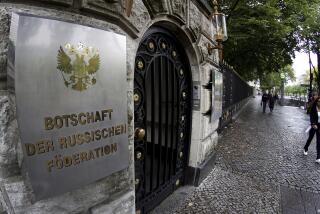House Votes to Ban Soviet Employees at U.S. Embassy
- Share via
WASHINGTON — The House, voicing concern about security leaks and KGB intelligence efforts, voted Wednesday to ban the employment of Soviet citizens in the U.S. Embassy in Moscow after Sept. 30, 1986.
The move, opposed by the State Department and some Democrats, was approved on a voice vote amending the fiscal 1986 State Department authorization bill. The measure has not been considered by the Senate.
The embassy in Moscow and the U.S. Consulate in Leningrad employ 211 Soviet citizens in support and translation services, the State Department said, and department officials argued that they are needed to conduct business efficiently.
However, the Soviet Embassy in Washington and the consulate in San Francisco are said by the State Department to employ only eight Americans, with Soviet citizens performing support jobs.
The State Department has said it is “well aware that some employees in the Soviet Union have the potential for (carrying out) intelligence functions.” However, it has said it bans the Soviet citizens from sensitive areas where classified material is kept.
Supporters of the amendment argued that the employees are actually agents of the KGB, the Soviet security police and intelligence agency, who funnel sensitive information to their government. However, concern also has been expressed that some of the Soviet personnel could be double agents working for the United States and that firing them would jeopardize U.S. intelligence efforts.
The measure, offered by Rep. Jim Courter (R-N.J.), was prompted to some extent by the discovery “that typewriters in the Moscow embassy had been bugged from 1982 to 1984, causing a significant breach of security,” Courter wrote to other members of Congress.
In another action Wednesday, the House voted to require the department to issue an advisory on the dangers of traveling in the area of Guadalajara, Mexico, until the killers of U.S. drug agent Enrique S. Camarena are brought to justice. No such advisories, which are not binding, have yet been issued.
The State Department had no official reaction to either vote in the House. However, one department official, speaking on the condition that he not be identified, said the dilemma caused by the employment of Soviet citizens in U.S. diplomatic offices is an issue “with which we are concerned.”
The official raised the possibility that finding Americans to fill the jobs taken by Soviet citizens--janitors, carpenters, gardeners, cooks, painters--would be difficult.
“What’s the career track for washerwomen?” he asked, referring to the professional path of career Foreign Service officers. “You won’t find takers, because they are not career builders.”
Moreover, he said, reducing the security risk posed by the employment of Soviets in non-sensitive areas of the embassy could be offset by the added risk of placing young Americans--probably single and living in Moscow without their families--”in the hostile environment of the Soviet Union,” where they could be subject to inducements to spy on the embassy.
“There are ramifications that have to be thought through, long and hard,” he said.
In an interview, Courter said after the vote that “there is the possibility a non-highly skilled person could be induced into becoming a spy. But the odds are a heck of a lot less” than the likelihood that a Soviet worker would be a KGB agent.
Times staff writer Zack Nauth contributed to this story.
More to Read
Sign up for Essential California
The most important California stories and recommendations in your inbox every morning.
You may occasionally receive promotional content from the Los Angeles Times.













